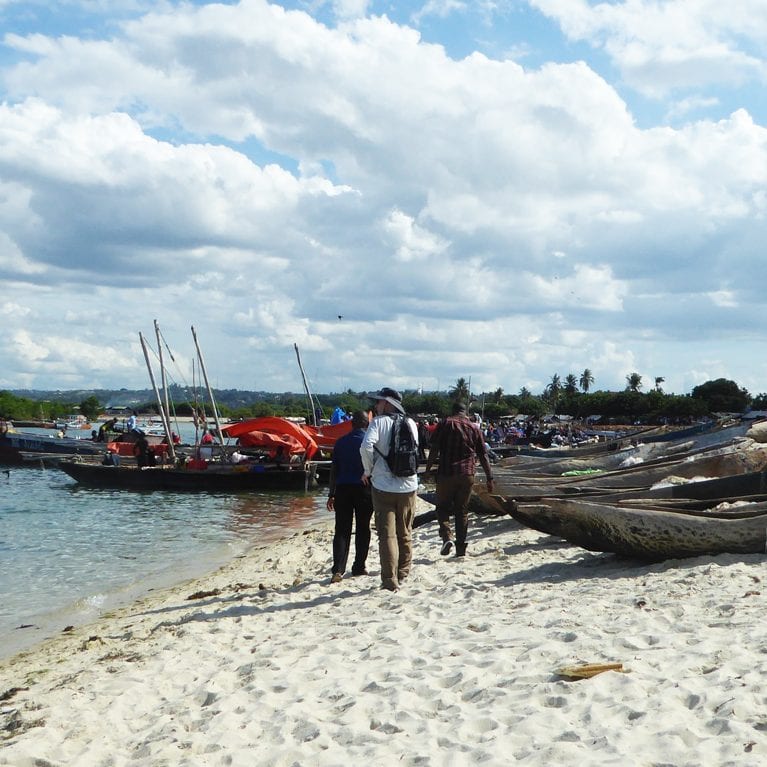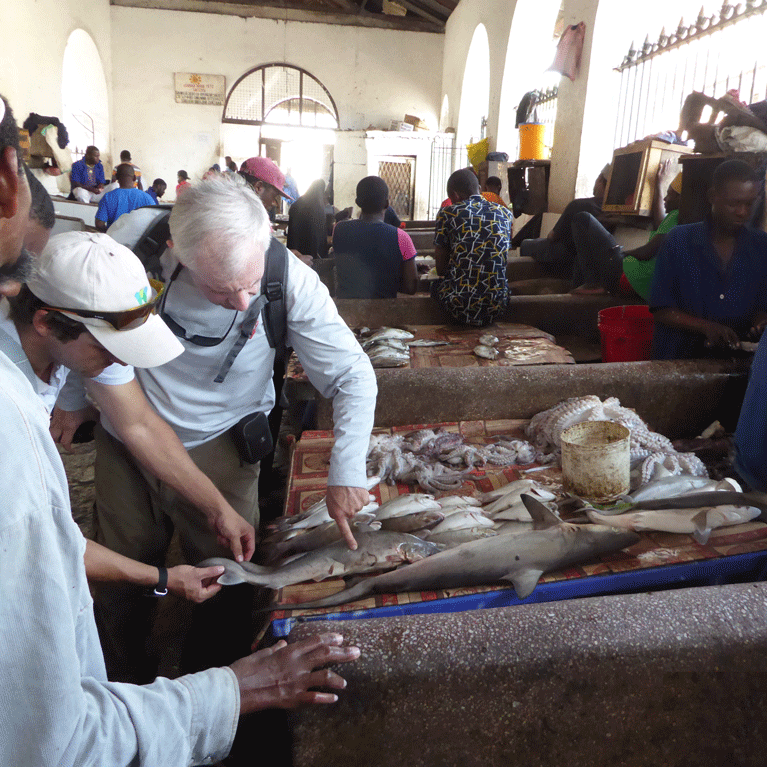Playing for time
The shark-like rays are some of the most threatened species in the sea. In the Western Indian Ocean, Dave is untangling their taxonomy, getting to know where they live and investigating their fisheries status in order to inform better conservation strategies.
I’m known as the ‘Lost Shark Guy’ and throughout my career I have searched for, and frequently found, those unknown or little-known sharks, rays and ghost sharks that most people know almost nothing about. How did I get interested in sharks? It started with my parents who gave me a book when I was about five years old. Thumbing through the pages and looking at the various illustrations, I thought these were the coolest critters I had ever seen! I was hooked at an early age and decided I was going to make it my lifelong passion to...



Playing for time: Guitar- and Violyn Sharks, is this the last dance?
The project aims will be to 1) clarify the taxonomic status; 2) biogeography; and 3) fisheries status of western Indian Ocean guitar- and wedgefishes, in order to provide improved species-specific identification for fisheries data collection for developing and implementing better conservation strategies and fisheries management policy, e.g. compliment NPOAs.
Recent studies have pointed to the concern that batoids in general, and more specifically those of the order Rhinopristiformes, are among the most endangered Chondrichthyan species globally. One family, the sawfishes (Pristidae), is among the most critically endangered groups, with all species having been extirpated from much of their range. While steps have been taken to address concerns over these charismatic shark-like rays, three families with this order (Glaucostegidae, Rhinidae, Rhinobatidae) exhibit similar life history and habitat characteristics that make them exceptionally vulnerable to overexploitation, leading to extirpation and possible extinction. In addition to the highly sought after flesh for human consumption, the fins are of extremely high value in the shark-fin trade, with fin prices for the larger species bringing significantly higher value than the meat. The challenges facing these shark-like rays, includes misidentification, incomplete biogeography, fisheries data, and political will to implement conservation and fisheries management policies.
The Western Indian Ocean (WIO) holds one of the most diverse Chondrichthyan fauna’s globally with >300 species, and with 19 new species described since 2016; this represents ~30% of all new species named during this period. The region also has a high degree of endemism, with 60+ species, many of which have very restricted geographic ranges. The number of new WIO species being discovered does not appear to show any signs of slowing, with additional new species currently under investigation. Five of the top 26 major fishing countries for Chondrichthyans are located in the WIO, but species-specific landing data for most species is unavailable. This is due to a combination of many species being inadequately describe, a lack of well defined external characteristics for identification, and poorly defined biogeographic ranges. In addition, there is a lack of identification guides for field observers monitoring and recording coastal Chondrichthyan landings. The lack of species-specific information has lead to concern over the population status of many species. A recent review of the threat status of WIO Chondrichthyans found that slightly more than one-half (50.9%) of Arabian Sea and nearly 30% of southern African species were assessed as vulnerable or higher (Ebert & van Hees, 2015; Jabado et al., 2018). This includes several species not seen in decades that maybe extinct? The number of WIO threatened species is much higher than reported by Dulvy et al. (2014) who found slightly >17% of all species were assessed as vulnerable or higher. Of the taxa reviewed, Dulvy et al. (2014) determined the shark-like rays (Rhinopristiformes) were highly threatened; this included the guitarfish and wedgefish, the latter also referred to as violyn sharks. Reviewing the conservation status of WIO guitar- and violyn sharks for this proposal found that of the 23 species known to occur in the region 12 (>51%) are assessed as vulnerable or higher. This includes one and possibly two species not been seen since the 1920s, and may now being extinct. Six species are assessed as data deficient, four near threatened, one least concern, and one species has not been assessed. 15 species are endemic, with some as presently known having a very limited biogeographic range. A problem with monitoring and recording data for these shark-like fishes is a lack of external characteristics to identify individual species, and a lack of knowledge on the biogeographic range. For example, during recent field surveys by PI Ebert two new species were identified, two species not seen in over a decade were found, and the distribution of several species extended. In addition, two new species have been described in the past two years. These findings highlight the lack of basic taxonomic and biogeographic information for the WIO. The closely related sawfishes have disappeared from large areas they once inhabited with relatively little notice, and despite recent conservation measures it may just be too late to ever reestablish these iconic rays to their former range given the slow call to action. Similarly, unless immediate action is taken the same fate may await the guitar- and violyn sharks as they play for time and we ask ourselves “Is this the last dance for these sharks?”
- Taxonomic component – Species-specific identification and taxonomic clarification of guitarfish and wedgefish throughout the Western Indian Ocean (WIO), including descriptions of at least two new species, and revised descriptions of poorly known species. This will include both field and laboratory aspects, and involve traditional morphological analysis and newer molecular tools.
- Biogeographic component – Using improved species-specific identification to determine biogeographic limits of individual species. The scientific, fishery, and conservation communities were slow to address the identification and biogeographic range of sawfishes, which slowed recovery efforts of this critically endangered group. This component will address that knowledge gap for guitarfish and wedgefish.
- Fisheries data collection – Introduce species level identification for collection of catch data on guitarfishes and wedgefishes. Field surveys by the project leader has lead to range extensions and identification of several species once thought to be rare, but are being fished heavily. In addition, one species may now be extinct!
- Fishery landing sites – Identify major landing sites for these fishes throughout the WIO. Prior research by the project leader on an unrelated project lead to the determination that guitarfishes and wedgefishes are being caught and landed, but these sites are not being monitor for catch landings of these species.
- Conservation strategy – The findings from this project will generate and help provide information to complement current efforts in developing National Plans of Action. It will also provide the tools for developing science based information that can be used for future IUCN Red List Assessments, CITES, CMS, etc.

